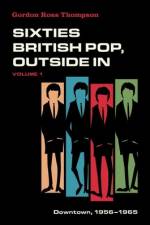- Volume I: Downtown, 1956-1965
av Gordon Ross Thompson
397 - 1 061
Downtown, 1956-1965--the first volume of Sixties British Pop, Outside In--describes the rise of London's music and recording cultures through the stories of those who empowered Britain's youth to be young. As the generations born in the postwar world entered adolescence and demanded a say in their lives, British musicians responded by creating music reflecting youth's quest for love and recognition. With waves of technological innovation sweeping through a world where political and economic superpowers postured for domination, deep-seated English values helped shape both pop music and its audiences. The music that reverberated in hundreds of local clubs and halls began as fervent attempts to imitate an ongoing American cultural invasion that television helped bring into front rooms across Britain. The emergence of British blues and rock 'n' roll began when broadcasters allowed teens to discover Tommy Steele, Cliff Richard and the Shadows, Adam Faith, Helen Shapiro, and others. These pioneers provided an opening for the Beatles to lead a northwest invasion of an unsuspecting London. Soon, from across the nation, the Rolling Stones, the Animals, the Kinks, and a host of other groups, and singers such as Petula Clark, Tom Jones, and Donovan were feeding their music into the same media stream that the US had dominated. Americans, reeling from the assassination of a president, embraced the unmitigated joy and optimism they heard and called it the British invasion. Based on extensive research and drawing on vintage and original interviews, Downtown, 1956-1965 frames the extraordinary rise of British pop in an era when pharmaceutical discoveries and electromagnetic innovation were altering lives. A community of musicians, producers, music directors, engineers, songwriters, publishers, promoters, broadcasters, and journalists provided songs, made and played recordings, organized concerts, and wrote about music expressing the exuberance of youth culture. They brought audiences together and gave individuals identity. Moreover, the fruits of their efforts set in motion the musical world in which we live today.

